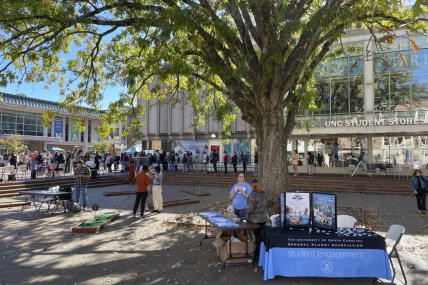Watch: Teaching our story. What’s behind Black students’ desire to take AA studies course
Interest in advanced placement Black studies is on the rise
The wrangling continues over AP African American studies courses. An effort to prevent the curriculum from being taught in public schools has increased interest and demand. Now the course is being offered in high schools across the country. theGrio’s Marc Lamont Hill discussed the issue with two academics. The following is a transcript of that conversation:
Marc L. Hill: It’s been just under a year since AP African-American studies classes started being offered at 60 schools across the country. The course gained a lot of attention after essentially being banned in Florida due to the state’s laws on teaching about race or just about anything else that makes sense. Despite being off limits in the sunshine state, the course is seeing a surge in demand and will be tested in about 800 high schools this fall. Joining me now is Dr. Brandi Waters. She’s the senior director for AP African-American Studies, and I’m also joined by Emmett Glenn, the third, an AP African-American studies teacher at Baton Rouge Magnet High School. Thanks so much for joining me, both of you. Dr., I want to start with you. What do you feel is behind the surge in demand? Do you think this news coverage around Florida and all the curriculum drama has played into it?

Brandi Waters: Thank you so much for having us. I actually think that students are really drawn to relevant courses that equip them to understand the world that they live in. And African-American studies have been one of the most requested courses time and time again by students and teachers. So we’re getting feedback from students that the course is so meaningful. They’re telling us about how it feels to learn this content, the discussions that they’re having, how surprised they are by what they’re learning. So I think that there’s been an excitement for this kind of course for a long period of time. And also the deep and enriching work of teachers like Emmett is really fueling the demand and shares the good experiences that folks are having. So I think that’s why so many more students want to join the pilot.
Hill: What are some of the things that this kind of course covers? And the reason why I ask that is because if you watch national news, you would think that it’s all about making white people feel bad. It’s all about making up fake histories. It’s all about, you know, all kinds of mythologies rather than something that is the substance of an AP course. Help us understand what’s actually getting covered.
Emmett Glenn: So actually what we’re covering, we’re covering four units that cover everything from the shores of Africa, or Africa in general, to slavery and resistance. And the practice of freedom is, as we call it, after the Civil War and then the movements and debates unit in which we cover the civil rights movement to up to today. One of the things that Brandi mentioned every day in the news, I tell my students that they can find something connected to our course. This course is relevant and it’s authentic. And I think those are the things that resonate with a lot of the young people who are interested in taking this course. And we cover so many different things that might not get covered in other classes in the detail that we do things such as the history of Fort Mosey. A lot of people who came to my class came believing that 1619 was the very beginning of African people of African descent in this in this on the North American continent. And when we study things like Fort Mosey and Juan Guarido and other Spanish explorers, we find that it was they preceded 1619 by quite some time.
Hill: That’s an important conversation to have. Brandi, some people say why are we so focused on race? Why are we so focused on slavery? Why are we so focused on even the practice of freedom when there are so many modern or contemporary issues that we should be thinking about in terms of making our society better or celebrating our democracy or all the kind of virtues of American life, why is it important to focus on the past so much in the Black Studies course?
Waters: So I think all of this is connected. And as a historian, this history that people mentioned is not actually that far ago. So I think it’s important for us to understand that coherent narrative of African-American experiences and the diversity of these experiences in order to even focus on where we are now. It’s important to understand enslavement in order to understand how that creates our citizenship. It’s important to understand the ways that Black people have innovated culture and the arts through struggle in order to really appreciate, for example, the global impact of Black cultural production on communities all around the world. So I think that this history is not distant from us, but I also think it’s directly connected to all of the challenges and also the celebrations that we encounter today, that we see Black people trying to think through the contributions that Black communities are making to the world that we live in.
Hill: I’m gonna ask both of you all this question because I want your take on this. I’ll start with you, Emmett, then I’ll swing back to the good doctor. But when you hear these regulations and rules in Florida schools that are emerging, this idea that you know, if we talk about violence against Black people, like, say, the Tulsa massacre, we also have to include narratives or information about violence that black people committed even in that circumstance, that conversations about slavery are supposed to include extolling the virtues of what black folk or enslaved African folk learned from slavery, what skills they obtained from slavery. When you hear those kind of rules attempting to make their way into our curricula, what do you say? What do you feel?
Glenn: So first off, the way the discourse is laid out, it is — I would like to call it a community course in the sense that the history is a community history of sorts of the African-American people. And when we talk about these things, we know that the stories that we cover in our classroom and the things in our course framework, many of these stories have been shared by grandmothers, by grandfathers, by people in the neighborhood, by individuals who have shared the history with the students. So I think that when people are, you know, maybe, you know, think that we’re teaching something other than that by bringing in narratives that have not been part of the accepted historical record per se, I think that they need to take a closer look at our framework and what we’re doing because the framework is laid out. All of the topics of that 89 plus and the kids are really excited about that.
Hill: Brandi, I want you to weigh in on that. But also, you know, this idea that these courses are just for Black students, that somehow AP calculus and AP physics is for everybody. But somehow, AP Black studies, AP African-American studies is only for the Black students. How do you, how do you respond to that as well and throw it in the mix?
Waters: Sure. So I’ll start with your first question. I think for us, we are focused on providing a really great, engaging and coherent course for students that also offers them the opportunity to get college credit. So based on that, we want to make sure that this course is held to the highest standard of what experts in the field deem to be the most important facets of African-American history and culture for students to learn in an introductory level. And that’s how we make decisions about what’s in the course and what’s not in the course, not based on strictures or pairings. It’s really aligning the course to the expectations of colleges and scholars at this present moment. And in terms of the course, I think the course is absolutely for everyone. As a person who did not have the opportunity to learn about this history until I got to college, it was that course that I took as a freshman at Penn. It was a course that was diverse. It had everyone in it, not just Black students. But it was so important for me to learn about this history and all of the challenges that we faced in conversation with my friends in our community, with people who are in communities that feel adjacent. I know my professors and my teachers were all very good at helping us to see connections between some of these larger systemic things that students are learning about. So whether it’s enslavement on a global scale, racial capitalism or decolonization, these are things that have particular experiences for African-American communities but also are part of what connects the U.S. to the broader world. So I would say this course is an invitation for students who have not typically been invited into AP courses, but it is absolutely for all students.
Hill: Absolutely for all students. And it’s an important course. And the fact that you all continue to do the intellectual labor of designing and redesigning the course, of adding and appealing to the words and the ideas of the best scholars around the world. It’s a testament to your efforts and also to the richness of Black studies around the country and around, indeed around the world. Brandi Waters, Emmett Glenn, the third, I want to thank you both for joining me and thank you for the efforts you make, not just in teaching these courses and designing these courses, but spreading the word about the truth surrounding these courses given so many lies that are out there.
Learn more about “the AP African American studies debate” from the clip above, and tune into theGrio with Marc Lamont Hill tonight and every weeknight at 7 pm ET on theGrio cable channel.
TheGrio is FREE on your TV via Apple TV, Amazon Fire, Roku and Android TV. Also, please download theGrio mobile apps today!


